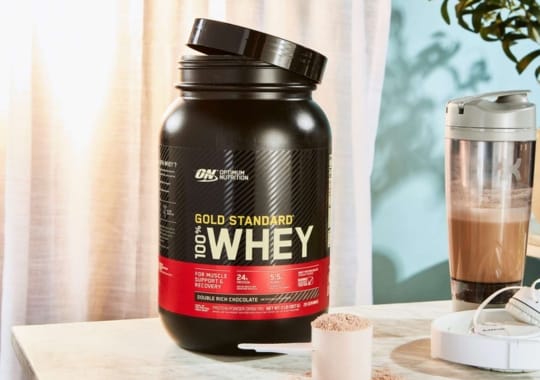As Amazon affiliates we may earn a commission if you purchase a product at no cost to you
Are you familiar with the buzz around clear whey isolate and wonder how it compares to the tried and true whey protein? Well, you've come to the right place! In this article, we'll dive into the world of protein supplements to explore the differences between clear whey isolate and whey protein.
Whey Protein Concentrate (WPC)
Whey protein concentrate (WPC) is not only an essential component of various protein supplements but also holds significant importance in the realm of sports nutrition and general health. As the initial form of whey protein derived from milk, WPC undergoes a series of processing steps to separate it from other components like carbohydrates and fats. This meticulous filtration process yields a protein concentration of approximately 80%, making it a potent source of high-quality protein.
One of the key attributes of whey protein concentrate is its retention of immune-boosting fractions. These bioactive compounds, including lactoferrin, immunoglobulins, and glycomacropeptides, play vital roles in supporting immune function and overall health. By preserving these fractions, WPC not only serves as a source of essential amino acids for muscle repair and growth but also contributes to bolstering the body's immune defenses.
Moreover, WPC boasts a relatively fast digestion time, typically ranging from 2 to 3 hours. This rapid digestion rate ensures that the amino acids derived from WPC are efficiently absorbed into the bloodstream, facilitating the replenishment of depleted muscle stores and promoting post-workout recovery. For athletes and fitness enthusiasts, this characteristic makes WPC an invaluable dietary supplement, particularly when quick nutrient delivery is paramount for optimizing performance and enhancing muscle adaptation to exercise.
Beyond its role in sports nutrition, whey protein concentrate holds promise as a versatile nutritional ingredient with potential applications in various dietary contexts. Its high protein content, coupled with its favorable amino acid profile and bioactive compound content, makes it a valuable component in protein bars, shakes, and other functional food products aimed at promoting muscle health, weight management, and overall well-being.
In summary, whey protein concentrate stands out as a foundational protein source revered for its high protein content, retention of immune-boosting fractions, and rapid digestion rate. Whether utilized as a standalone supplement or incorporated into a diverse array of food products, WPC continues to garner attention for its multifaceted benefits in supporting muscle recovery, immune function, and overall health and vitality.

Whey Protein Isolate (WPI)
Whey protein isolate (WPI) represents a refined form of whey protein that undergoes additional filtration processes to elevate its protein concentration to approximately 90%, while minimizing the presence of carbohydrates and fats. This meticulous purification process yields a protein powder with exceptionally high purity and potency, making it a preferred choice among fitness enthusiasts, athletes, and individuals seeking optimal protein supplementation.
One of the primary distinguishing features of whey protein isolate is its markedly reduced levels of carbohydrates, fats, and other non-protein components. By virtue of its heightened protein concentration, WPI delivers a more concentrated dose of essential amino acids, the building blocks of muscle tissue, without the additional caloric load associated with carbohydrates and fats. This characteristic renders WPI an excellent option for individuals aiming to maximize protein intake while minimizing calorie consumption, making it particularly suitable for those pursuing weight loss or lean muscle development goals.
Furthermore, the filtration processes employed in producing WPI result in the creation of smaller protein particles with enhanced solubility and bioavailability. This translates to a higher biological value compared to whey protein concentrate, signifying that a greater proportion of the ingested protein is absorbed and utilized by the body for muscle synthesis and repair. Consequently, WPI is prized for its efficacy in promoting muscle recovery and growth, facilitating the attainment of fitness and performance objectives.
Despite its remarkable purity and protein potency, whey protein isolate may exhibit lower levels of immune-boosting fractions compared to its concentrate counterpart. While WPI retains essential amino acids crucial for supporting immune function, the filtration processes involved in its production may lead to a reduction in certain bioactive compounds known to bolster immune health. However, for individuals primarily focused on maximizing muscle recovery and protein assimilation, this trade-off is often outweighed by the superior protein concentration and digestibility offered by WPI.
Moreover, whey protein isolate is characterized by its rapid digestion time, typically ranging from 30 minutes to 1 hour. This swift absorption kinetics ensure that the amino acids derived from WPI are promptly delivered to muscle tissues, enabling efficient replenishment of depleted nutrient stores and facilitating post-exercise recovery. Consequently, WPI is favored as a post-workout supplement, providing a readily available source of protein to support muscle repair, glycogen replenishment, and overall recuperative processes following strenuous physical activity.
Whey protein isolate stands as a pinnacle of protein supplementation, revered for its unparalleled purity, potency, and rapid digestibility. By virtue of its elevated protein concentration, enhanced bioavailability, and swift digestion kinetics, WPI offers a highly efficacious means of replenishing and repairing muscle tissues, promoting post-workout recovery, and supporting overall athletic performance and physical well-being.
Whey Protein Hydrolysate (WPH)
Whey protein hydrolysate (WPH) represents the pinnacle of refinement in the world of whey protein supplementation. Employing an advanced process known as enzymatic hydrolysis, WPH undergoes extensive molecular breakdown, resulting in the generation of ultra-small protein particles known as peptides. This enzymatic treatment cleaves the larger protein molecules into shorter peptide chains, effectively predigesting the protein and priming it for rapid absorption upon ingestion.
One of the hallmark features of whey protein hydrolysate is its exceptional rate of digestion and absorption. Thanks to its predigested nature, WPH boasts an unparalleled ability to be rapidly assimilated by the body, with absorption typically occurring within a remarkable timeframe of 0 to 30 minutes following ingestion. This rapid digestion kinetics set WPH apart from other forms of whey protein, including whey protein isolate (WPI), enabling it to deliver an instantaneous influx of amino acids to the bloodstream, thereby expediting the process of muscle repair and growth.
Despite undergoing extensive enzymatic processing, whey protein hydrolysate retains an impressive protein content of approximately 90%, making it a potent source of essential amino acids critical for supporting muscle protein synthesis and recovery. This high protein potency, coupled with its rapid digestion rate, renders WPH an optimal choice for individuals seeking to accelerate post-exercise recovery and capitalize on the anabolic window following intense physical activity.
Moreover, whey protein hydrolysate offers distinct advantages over other forms of whey protein, particularly in the context of post-exercise nutrition. Its rapid digestion and absorption profile make it ideally suited for consumption immediately following workouts, where the body's demand for nutrients is heightened, and muscle tissue is primed for repair and regeneration. By providing a swift supply of amino acids to muscle cells, WPH facilitates the restoration of glycogen stores, minimizes muscle protein breakdown, and promotes the synthesis of new muscle tissue, thereby optimizing the recovery process and fostering muscular adaptation to training stimuli.
In summary, whey protein hydrolysate stands as the epitome of whey protein refinement, characterized by its ultra-fast digestion, superior bioavailability, and potent protein potency. By virtue of its predigested nature and rapid absorption kinetics, WPH represents an invaluable tool for athletes, bodybuilders, and fitness enthusiasts seeking to maximize post-workout recovery, enhance muscle growth, and optimize performance outcomes. As a result, whey protein hydrolysate occupies a prominent position in the realm of sports nutrition, offering a convenient and effective means of supporting athletic endeavors and achieving peak physical condition.
Casein Protein
Casein protein, distinct from whey protein in its digestion kinetics and physiological effects, offers unique benefits in the realm of sports nutrition and muscle health. Unlike whey protein, which is rapidly digested and absorbed, casein protein undergoes a slow and sustained digestion process that spans over a prolonged period, typically lasting 7 to 8 hours.
Upon consumption, casein forms a gel-like substance in the stomach due to its unique molecular structure. This gel-like consistency delays the emptying of the stomach contents into the small intestine, resulting in a gradual and sustained release of amino acids into the bloodstream. This slow and steady influx of amino acids provides a prolonged supply of nutrients to muscle tissues, facilitating muscle protein synthesis and repair over an extended period.
One of the key advantages of casein protein lies in its ability to support muscle recovery and growth during periods of fasting, such as overnight sleep. By virtue of its slow digestion rate and sustained amino acid release, consuming casein before bedtime helps maintain an anabolic state throughout the night, minimizing muscle breakdown and promoting muscle repair and growth. This makes casein an excellent option for individuals seeking to optimize recovery and muscle adaptation during periods of rest and recovery.
Furthermore, casein protein's sustained-release properties make it particularly beneficial for individuals with high protein requirements or those looking to manage their appetite and maintain satiety over an extended period. By providing a steady supply of amino acids, casein protein helps regulate hunger hormones and promote feelings of fullness, thereby supporting weight management and adherence to calorie-controlled diets.
In summary, casein protein offers distinct advantages over whey protein, particularly in its slow digestion kinetics and sustained-release properties. By providing a prolonged and steady supply of amino acids to muscle tissues, casein protein supports muscle protein synthesis, recovery, and growth over an extended period. Whether consumed before bedtime to support overnight muscle repair or as part of a balanced diet to manage appetite and promote satiety, casein protein serves as a valuable tool for individuals seeking to optimize their muscle health and overall well-being.

Protein Blend Supplements
Many protein supplements on the market combine different types of whey protein, along with other protein sources like casein, to create blends that offer a comprehensive array of benefits. For example, products such as gold standard whey often contain a mixture of whey protein concentrate, isolate, and hydrolysate. These blends cater to various needs, providing fast-acting proteins for immediate recovery post-workout, as well as slower-digesting proteins for sustained protein release throughout the day or night.
Understanding the distinctions between whey protein types empowers individuals to select the most suitable option based on their specific fitness goals and dietary preferences. Whether prioritizing muscle recovery, immune support, or protein timing, choosing the right whey protein can play a crucial role in optimizing overall health and performance.
Recommended Article

Frequently Asked Questions FAQ
Can I still build muscle with clear whey isolate?
Absolutely! While clear whey isolate may have a slightly lower protein content per serving, it still provides the necessary amino acids for muscle growth. Pairing it with a balanced diet and regular exercise will yield great results.
Is one option better than the other?
It depends on your personal goals and preferences. Whey protein is a versatile, well-rounded option, while clear whey isolate offers a unique taste and visual appeal with lower calorie and sugar content.
Which option is best for weight loss?
Clear whey isolate has a lower calorie and sugar content, making it an excellent choice for individuals aiming to lose weight. However, both options can contribute to weight loss when consumed as part of a calorie-controlled diet.
Conclusion
In the battle between clear whey isolate and whey protein, both contenders have their merits. Traditional whey protein remains a trusted choice for muscle growth and recovery, offering a wide variety of flavors to suit every palate. On the other hand, clear whey isolate brings a refreshing twist with its transparent appearance, lighter texture, and lower calorie and sugar content.










